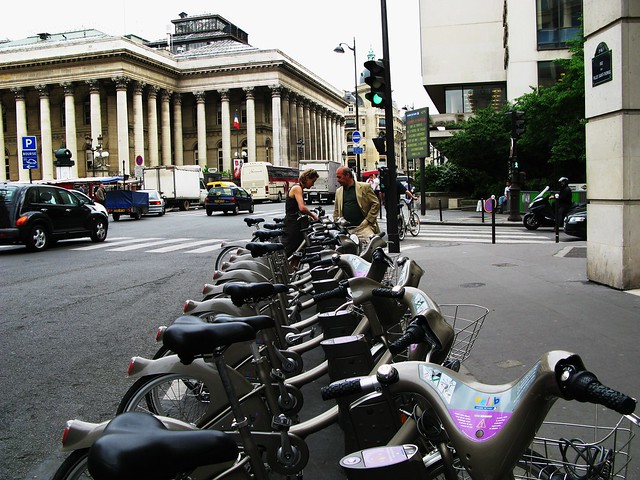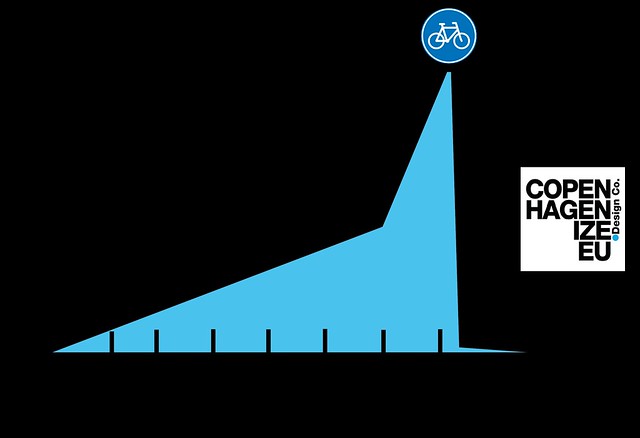

The trend illustrated above has manifested itself with increasing consistency over the past few years, with bike share schemes having spread to over 500 cities worldwide. 2013 saw a large number of new bike-share schemes introduced across the world, from New York to Nea Smyrini, and 2014 is set to be no different.
Despite the increasingly widespread use and popularity of bike share schemes, studies comparing their use and impact across different cities aren't always easily available. When Copenhagenize Design Co. was in Lausanne recently, we had a discussion with colleagues about bike sharing.
One source that was mentioned about how we can get a sense of how bike share schemes can be used most effectively comes from a colloquium in Strasbourg, where cycling experts converged on the city to share experiences and discuss bike sharing systems and their role within wider cycling policy. We're going to have look at some of the conclusions the experts drew, which provide us valuable insight into the role that bicycle-share schemes can have in our cities:
Firstly let's take a moment to consider the evolution of cycling policy during the three last decades:
1990s: Cycling policies were focused on creating a continuous network of cycle paths and on finding solutions to avoid micro-obstacles and breaks in the network.
=> Public bicycles were not a topic of interest.
2000s: Public policy became more global and began to take into account services for cyclists.
There was a general trend of increased infrastructure, services and promotion of cycling.
=> The role of bike share systems became essential both as a service, and as a means of communicating the importance of cycling to the public.
2010s: During this decade, urban planners focused on calming traffic by using strategies such as reducing the speed of cars and creating pedestrian areas, as well as infrastructure.
=> The consequence of this policy was a significant increase in the number of cyclists in city-centres, with bike share systems becoming just one element within the wider cycling context.
The colloquium drew some interesting conclusions regarding the effect of bike share systems on the wider urban transportation system:
First, (and unfortunately,) few car drivers have left their cars to switch to a public bike. Most of the users of bike-share bikes are former pedestrians and users of public transport. A few cyclists have stopped using their own bikes and instead have purchased bike sharing system subscriptions.
Generally speaking, the creation of public bike sharing systems has coincided with a boom in the number of cyclists. But the experts have noticed that in the French cities (Lyon, Paris, Montpelier, Toulouse, Bordeaux, Strasbourg and Lille) that set up a bike sharing system, the number of cyclists had already begun to rise before the public bike arrived.
The table below shows the increase in the number of cyclists in French city centres:
|
City |
Period |
Increase |
|
Lille |
From 1998 to 2006 |
+ 39% |
|
Lyon |
From 1995 to 2006 |
+ 300% |
|
Strasbourg |
From 1997 to 2009 |
+ 100,00% |
|
Bordeaux |
From 1998 to 2009 |
+ 150% |
Source : official survey about means of transport
Evolution of the number of cyclists and the number of two-wheeled motorised vehicles:
.jpg)
Source: Municipality of Paris
The experts discussed whether having a bike-share system is an effective means of transport or instead merely a good way to communicate about cycling. Indeed, bike sharing systems are fairly costly and cannot be set up in every urban area. The colloquium concluded that bike share schemes should not solely be seen as a means of transport but also as complementary to increased private bike use.
This is because bike share schemes are also an effective method of communication and in several cities they are used as a public representation of pro-cycling policy. It makes cycling more visible for a city's inhabitants. It is the sign of a municipality that is trying to create a more bicycle-friendly environment. In some cities, the bike-share bike has even reached the level of a tourist attraction. For instance, the French Vélib' has gained an international reputation and tourists visiting Paris are increasingly considering it an attraction of the city that they must experience.
This conclusion therefore caused the gathered experts to wonder what the most effective way to spend public money is. When municipalities get a budget for cycling policy, is it more efficient to spend it on developing a bike sharing system, to develop services, to promote cycling or to create new infrastructures for cyclists?
In the current economic climate, where public funds are more limited, setting up a bike-sharing system must not be considered as a final goal, but rather as one component of a broad public cycling policy. Bike sharing systems are useful but not essential. Their costs have to be analysed in detail to make sure that public money is invested where it is most effectively able to develop an appropriate cycling policy. Private bicycle usage and public bike schemes are not opposed but complementary.
The gathered experts in Strasbourg began to imagine the ideal context and set of policies for integrating bike-sharing schemes effectively with private cycling - in this ideal situation people would be ultimately encouraged to get (and use) private bikes. Cities would create room to park bikes (at home and in the street) and would develop a network of repair shops in the city. Renting a bike would be easy and convenient, with subscriptions covering several cities.
It seems simple, and in so many ways it is. The example of the Dutch system of rental bikes, OV-Fiet, available at multiple train stations across the country, was especially highlighted as a great example of this complementarity, and there is no reason why these findings from Strasbourg cannot be learnt from across the globe, to make sure that public bike share systems have the biggest and most positive impact possible.
Thanks to Tamara Bozovic in Lausanne for the link to this study:
Frédéric Héran -Centre lillois d’études et de recherches sociologiques et économiques
UMR 8019 Centre national de la recherche scientifique
Université de Lille 1, Cité scientifique, 59655 Villeneuve d’Ascq
September 2012





